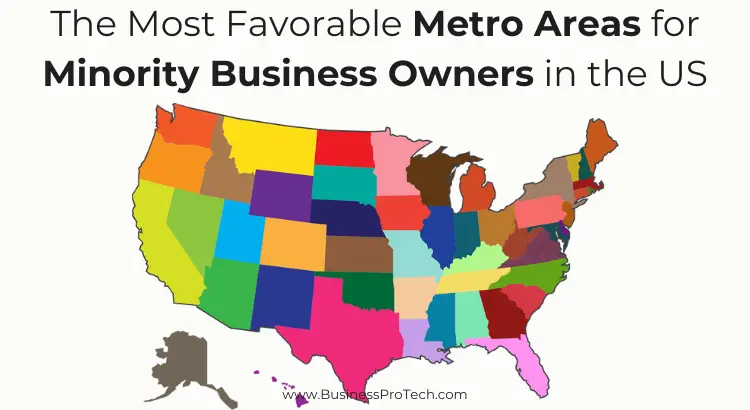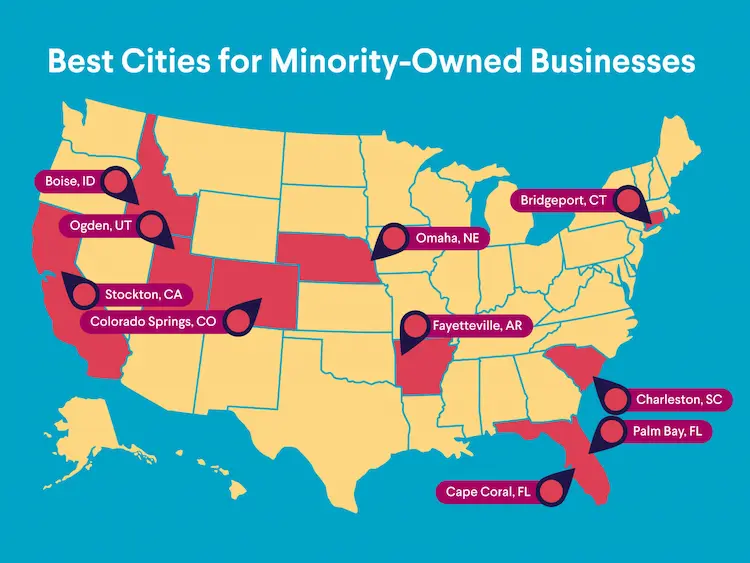Minority-owned businesses are not just a part of the American economy; they are a vital component of its foundation. These businesses bring diverse perspectives and innovative solutions to the marketplace, driving competition and fostering economic resilience. They also create jobs and provide essential services in their communities, contributing to the overall well-being of the population.
In recent years, minority business ownership has become an increasingly vital component of the American economy. A new report by SoFi, which analyzed 50 major metropolitan areas in the United States with populations of one million or less, highlights the most prosperous areas for minority business owners around the country. This report ranked these metro areas based on eight different criteria, including diversity, inclusion, prosperity, and minority-owned business representation. Notably, Cape Coral, Florida was named the top-ranked city, thanks to its high inclusion score, which played a significant role in its overall ranking.
Cape Coral’s number one ranking in the report underscores its commitment to fostering an inclusive environment for minority business owners in the waterfront wonderland. The city’s high inclusion score indicates that it not only supports diversity but also actively works to create opportunities for underrepresented groups.

Cape Coral’s racial equity and minority-owned business representation scores were also of note and played a role in the city’s top spot in the analysis. This data is exemplified through the growing number of minority-owned businesses in the area, which contribute significantly to the local economy.
Outside of the Sunshine State, across the Western United States, minority populations are on the rise, fueling a boom in minority-owned businesses. The report also highlights cities like Stockton, California, Ogden, Utah, and Colorado Springs, Colorado, are experiencing significant growth in their minority communities, which in turn is driving an entrepreneurial surge in these metro areas. This trend is not only enriching the cultural fabric of these cities but also contributing to economic growth and innovation.
The Importance of Access to Capital
Access to capital is one of the most critical challenges faced by minority business owners. Many minority entrepreneurs struggle to secure the funding they need to start and grow their businesses.
This issue is often exacerbated by systemic biases in the lending industry, for instance, it’s estimated that between 28%-32% of minority business owners are fully approved for financing, compared to 56% of white business owners. To combat this, banks and lending providers need to take a stand and expand access to grants, loans, and other financial resources specifically targeted at minority-owned businesses.
However, for those who have been lucky to receive support from grants and resources that give them access to capital they would have otherwise not had, there are several programs out there that have been fruitful.
The programs below offer vital funding and are designed to help minority entrepreneurs overcome the unique challenges they face and provide them with the tools they need to thrive.
- Grants.gov
- The USDA Rural Business Development Grant Program
- The Small Business Innovation Research (SBIR) Program
- The Small Business Technology Transfer (STTR) Program
The 2022 Annual Business Survey: A Snapshot of Minority-Owned Businesses

According to the 2022 Annual Business Survey (ABS), which covers the reference year 2021, there were approximately 5.9 million employer firms in the United States. Of these, 1.2 million, or 21%, were minority-owned.
This is a staggering percentage and highlights the significant presence of minority-owned businesses in the American economy and underscores their importance as a driving force behind economic growth and innovation.
Recent Gains in Minority Business Ownership
The White House Council of Economic Advisors recently highlighted the significant strides made in minority-owned businesses in the past few years. Notably, Black business ownership has grown at a faster pace between 2019 and 2022 than at any time during the last three decades.
This growth is a testament to the resilience and entrepreneurial spirit of minority communities, as well as the impact of targeted support and inclusive policies.
Challenges Faced by Minority Business Owners
Despite their significant contributions, minority business owners often face unique challenges that can hinder their success. These challenges include limited access to capital, discrimination, and lack of mentorship opportunities that give entrepreneurs access and to critical knowledge.
Addressing these issues requires concerted efforts from policymakers, financial institutions, community organizations, and entrepreneurial peers to create an environment where minority entrepreneurs can thrive.
The Role of Mentorship and Networking
The only saying, “It’s not what you know, but who you know,” stands true more than ever with minority businesses as mentorship and networking opportunities are crucial for the success of minority business owners. Having access to experienced mentors can provide valuable guidance and support, helping entrepreneurs navigate the complexities of running a business from discussing how to market your business to how to save money on shipping or convoluted tax policies.
Not only that, but networking opportunities can also open doors to new markets, partnerships, and resources, further aiding in the growth and success of minority-owned businesses.
Despite the economic turmoil most of America is facing right now, the rise of minority business owners in the United States is a positive and encouraging trend that benefits the entire economy. As cities like Cape Coral continue to lead by example with their inclusive practices, other regions need to follow suit and create supportive environments for minority entrepreneurs.
By addressing the challenges they face and providing access to vital resources, we can ensure that minority-owned businesses continue to thrive and contribute to America’s economic prosperity.

Wrap Up!
The recent gains in minority business ownership, particularly among Black entrepreneurs, are a testament to the resilience and determination of these communities. With continued support from policymakers and local communities that truly commit to lifting minority entrepreneurs, the future looks bright for minority business owners in the United States.
It’s important as ever to remember that minority business owners are not only driving economic growth but also enriching the cultural and social fabric of the nation, making the American Dream more accessible for all.